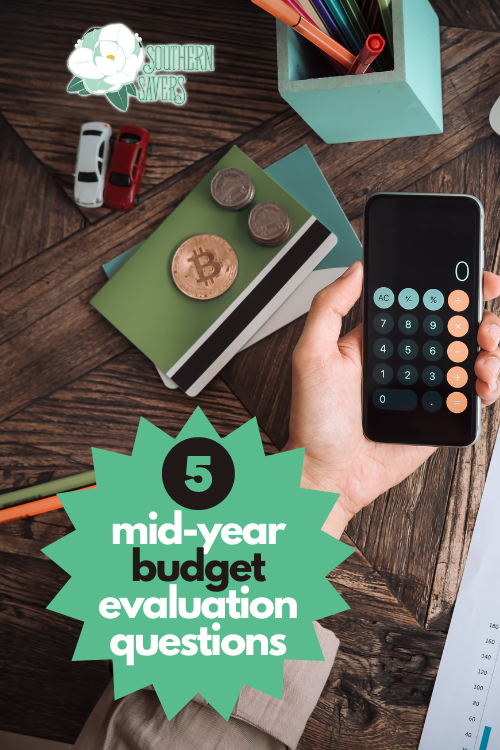This post may contain affiliate links. Read our disclosure here.

The year is more than halfway over, and I find this is a great time of year to look at my spending so far and see if I’m on track with where I had hoped to be. Maybe you set some goals at the beginning of the year–now is a great time to see if you’re meeting them or if something needs to change.
Follow along so you can do your own budget evaluation so you can finish off the second half of the year. Here are 5 questions to ask yourself about your budget and spending
If you are new to budgeting, check out my post on the 6 Best Budgeting Apps & Expense Tracking Programs.
5 Mid-Year Budget Evaluation Questions
1. How is your grocery spending going this year?
Many of us have a lot of fixed expenses every month that don’t change that much. Even some more variable expenses, like gas, can’t really be tweaked–you have to drive to work, right? I find that our grocery budget is the area of our budget that can fluctuate the most from month to month.
If you’re not tracking your spending, then that might be where you need to start! Make a commitment to track your grocery spending for the next few months, then come back to this post.

Assuming you have tracked your grocery spending, average how much you’ve spent on groceries per month over the past 6 months. If you have consistently spent more than you had planned, consider taking the next month to examine your spending more carefully and see if you can reduce it.
You may realize that the price of groceries has simply gone up! (it has, for many people.) If so, do you need to reallocate money from another part of your budget? Or perhaps you have an income problem and need to figure out how to increase your income.
2. Are you budgeting enough for increased utility costs?
The summer and the winter are both times when utility costs tend to go up. I live in the South, so our AC bill is always highest once the warm weather hits. We also end up with a higher water bill due to watering the garden.

If you aren’t already signed up for budget billing for your utilities, it will average your bill over the year so you know what to expect. Each year the utility company will revisit your actual usage and either decrease or increase your monthly amount to match your usage.
Our water bill doesn’t allow us to do budget billing, but I’ve set up my own by planning to contribute $112 in our budget category every month regardless of how much it is, because some months end up being higher than others.
3. Automate any bills that you don’t already have automated.
This is just a good thing to do periodically. Even if your bills don’t allow you to schedule bill payment online, there are often other ways to get around that issue. For example, if you are still mailing in a check somewhere every month, you can stop doing that. Most banks allow you to do that through them, saving you a stamp and making it one less thing you have to think about.
4. How is any debt payoff going?
How are you doing on paying off debt, if you have any? Is there any way you could put a little more each month toward debt and finish the year strong? Maybe you can have a yard sale and contribute a few hundred dollars. Maybe there is a side hustle you can do for the short term.

Some friends of ours recently had an unexpected vet bill for their dog. They were able to sign up for Care Credit to get the bill paid, and they have 6 months to pay the bill interest free. Her husband decided to mow yards in their neighborhood and that’s how they’re getting rid of that debt before the interest kicks in. Be creative–even just a couple hundred dollars helps!
5. Do you have money set aside for upcoming holidays, expenses, and trips.
If you don’t already have sinking funds established, now is a good time to start. A sinking fund is a category of your budget that you add a little to every month so that when you need that money, the category is already full!

Some upcoming things you may need to think about making sinking funds for are: school supplies, Labor Day travel, Fall Break, Thanksgiving, and of course, CHRISTMAS. Christmas happens every year and even if you celebrate minimally, there are always more expenses in December that don’t occur throughout the year. Even if you can only put aside $50/month from now until December, you will still have a little chunk of change ready for what you need it for.
Conclusion
After answering these 5 budget evaluation questions, you may feel a sense of anxiety. However, seeing the actual reality of your finances is actually a good place to be. If you are in denial about your spending OR if you truly don’t know the state of your finances, that is a very dangerous place to be. I hope you can use these questions to help you move forward and find yourself in a better financial place by the end of the year.



